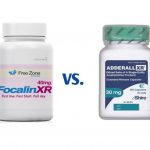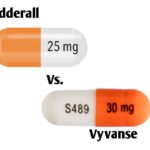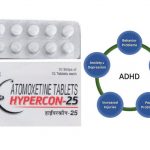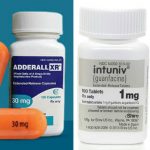Hypercon 25 Vs Adderall: Differences, Similarities Which is Better?
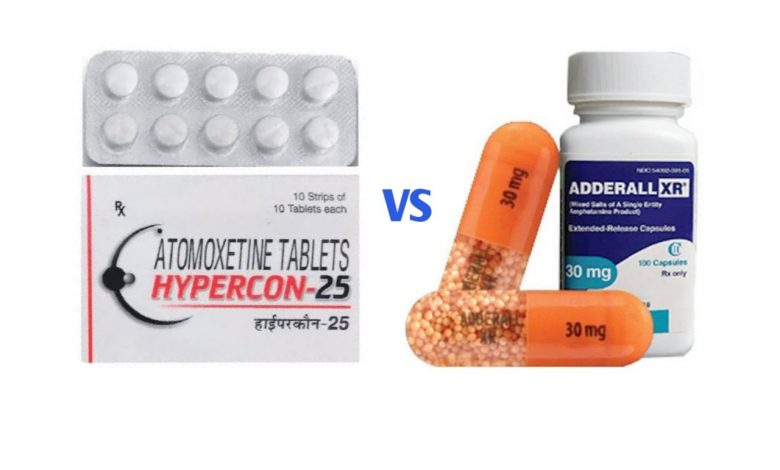
What is Adderall?
Adderall is a prescription medication that contains two drugs: amphetamine and dextroamphetamine. It belongs to a class of medications called stimulants. It’s most commonly used to treat attention deficit hyperactivity disorder (ADHD). It’s also used to treat narcolepsy.
Adderall helps people diagnosed with ADHD by improving their focus and concentration since it is a direct stimulant on the central nervous system. The medication has the same effect on those who do not have ADHD, and it’s important to remember that Adderall has side effects such as nervousness, restlessness, headaches, problems sleeping, and more
Adderall comes in two forms:
- Immediate-release version: You take it 2-3 times per day. The US Food and Drug Administration (FDA) recommends that ADHD patients should start with 5 mg of Adderall once or twice per day and increase as needed up to 40 mg per day. Children as early as 3 years old can take the immediate-release version.
- Extended-release version: You take it once per day and it delivers a steady dose throughout the day. The FDA recommends using 20 mg per day and children as young as age 6 can take the extended-release capsule.
How should I take Adderall?
Take Adderall exactly as prescribed by your doctor. Follow all directions on your prescription label. Your doctor may occasionally change your dose. Do not take this medicine in larger or smaller amounts or for longer than recommended.
Adderall may be habit-forming. Never share this medicine with another person, especially someone with a history of drug abuse or addiction. Keep the medication in a place where others cannot get to it. Selling or giving away this medicine is against the law.
Read all patient information, medication guides, and instruction sheets provided to you. Ask your doctor or pharmacist if you have any questions.
Typical dosing for Adderall immediate-release version
When taken for ADHD by adults and children 6 years of age and older, the typical starting dose of Adderall IR is 5 mg by mouth once or twice daily.
Typical dosing for the extended-release version
• Children ages 6 to 12 years old: The typical starting dose is 5 to 10 mg by mouth once daily. The provider might raise the dose if needed. The maximum daily dose of 30 mg per day.
• Teenagers ages 13 to 17 years old: The typical starting dose is 10 mg by mouth once daily. The provider might raise the dose if needed.
• Adults: The typical starting dose is 20 mg by mouth once daily.
You may take Adderall with or without food, first thing in the morning.
Do not crush, chew, break, or open an extended-release capsule. Swallow it whole.
To make swallowing easier, you may open the capsule and sprinkle the medicine into a spoonful of applesauce. Swallow right away without chewing. Do not save the mixture for later use.
While using this medicine, your doctor will need to check your progress at regular visits. Tell any doctor who treats you that you are using this medicine.
What is Hypercon 25?
Hypercon 25 is a brand of atomoxetine, also sold under the brand name Strattera, among others, Hypercon 25 is a medication used to treat attention deficit hyperactivity disorder. It is also used as part of a total treatment program to increase the ability to pay attention and decrease impulsiveness and hyperactivity in children and adults with ADHD.
Hypercon 25 is in a class of medications called selective norepinephrine reuptake inhibitors. It works by increasing the levels of norepinephrine, a natural substance in the brain that is needed to control behavior.
Hypercon 25 may be used alone or along with psychostimulants. Use of Hypercon is only recommended for those who are at least six years old.
How should I take Hypercon 25?
Hypercon 25 comes as a tablet to take by mouth. It is usually taken either once a day in the morning, or twice a day in the morning and late afternoon or early evening. Hypercon 25 may be taken with or without food. Take Hypercon 25 at around the same time(s) every day.
Follow the directions on your prescription label carefully, and ask your doctor or pharmacist to explain any part you do not understand. Take Hypercon 25 exactly as directed. Do not take more or less of it or take it more often than prescribed by your doctor.
Swallow Hypercon 25 capsules whole; do not open, chew, or crush them. If a capsule is accidentally broken or opened, wash away the loose powder with water right away. Try not to touch the powder and be especially careful not to get the powder in your eyes. If you do get powder in your eyes, rinse them with water right away and call your doctor.
Your doctor will probably start you on a low dose of Hypercon 25 and increase your dose after at least 3 days. Your doctor may increase your dose again after 2–4 weeks. You may notice an improvement in your symptoms during the first week of your treatment, but it may take up to one month for you to feel the full benefit of Hypercon 25.
Hypercon 25 may help to control the symptoms of ADHD but will not cure the condition. Continue to take Hypercon 25 even if you feel well. Do not stop taking Hypercon 25 without talking to your doctor.
Hypercon 25 Vs Adderall
Studies indicate that Hypercon 25 may be better tolerated than Adderall because its main side effects are drowsiness and mild appetite suppression. Nevertheless, Adderall is still considered the first-choice treatment option for ADHD.
Studies of Adderall and Adderall XR show that they improve attention and focus, and reduce impulsive behaviors. Between 75 percent and 80 percent of children with ADHD will see improved symptoms with the use of stimulants such as Adderall.
However, both Hypercon 25 and Adderall may affect the heart and slow growth rate in children.
What side effects can Hypercon 25 cause?
Hypercon 25 may cause side effects. Tell your doctor if any of these symptoms are severe or do not go away:
- burning or tingling in the hands, arms, feet, or legs
- constipation
- decreased sex drive or ability
- difficulty urinating
- dizziness
- dry mouth
- excessive tiredness
- gas
- headache
- heartburn
- hot flashes
- loss of appetite
- mood swings
- muscle pain
- nausea
- painful or irregular menstrual periods
- stomach pain
- sweating
- unusual dreams
- vomiting
- weight loss
Some side effects can be serious. If you experience any of the following symptoms, call your doctor immediately:
- abnormal thoughts
- chest pain
- dark urine
- difficulty swallowing or breathing
- dizziness or faintness
- erection that lasts for several hours or longer
- fast or pounding heartbeat
- flu-like symptoms
- hallucinating (seeing things or hearing voices that do not exist)
- hives
- hoarseness
- itchy skin
- pain in the upper right part of your stomach
- rash
- seizures
- shortness of breath
- slow or difficult speech
- swelling of the face, throat, tongue, lips, eyes, hands, feet, ankles, or lower legs
- weakness or numbness of an arm or leg
- yellowing of your skin or eyes
Hypercon 25 may slow down children’s growth or weight gain. Your child’s doctor will probably monitor your child carefully during his or her treatment with Hypercon 25. Talk to your child’s doctor about the risks of giving this medication to your child.
Hypercon 25 may cause other side effects. Call your doctor if you have any unusual problems while taking this medication.
What side effects can Adderall cause?
Adderall can also cause mild or serious side effects. The following list contains some of the key side effects that may occur while taking Adderall. This list doesn’t include all possible side effects.
For more information on the possible side effects of Adderall, or tips on how to deal with a troubling side effect, talk with your doctor or pharmacist.
More common side effects
The more common side effects of Adderall can include:
- anxiety
- constipation
- dizziness
- dry mouth
- headache
- lack of appetite
- nausea
- stomach pain
- trouble sleeping
- weight loss
These side effects may go away within a few days or a couple of weeks. If they’re more severe or don’t go away, talk with your doctor or pharmacist.
Serious side effects
Call your doctor right away if you have serious side effects. Call 911 if your symptoms feel life-threatening or if you think you’re having a medical emergency.
Serious side effects and their symptoms can include the following:
- agitated or aggressive behavior
- blurred vision
- depression
- hallucinations
- heart problems, including high blood pressure, rapid heartbeat, heart attack, and stroke
- impaired or delusional thinking
- irritability
- muscle breakdown called rhabdomyolysis
- severe allergic reaction
Long-term effects
Adderall is safe to use long-term when taken at doctor-recommended dosages. For many people, common side effects such as loss of appetite, dry mouth, or insomnia are reduced with continued use of the drug. For others, these side effects may continue.
Long-term use of Adderall or other stimulants may cause some changes in the brain, such as decreases in the amount of the chemical messenger dopamine. This seems more likely to happen in people who misuse Adderall in high doses. (Drug misuse is also called abuse.)
When Adderall is misused, long-term use can lead to physical and psychological dependence. Inappropriate use can lead to many serious side effects, including:
- anorexia and unwanted weight loss
- depression
- fatigue
- heart damage
- moodiness or irritability
- severe insomnia (trouble sleeping)
- skin disorders
- symptoms of psychosis such as aggression and hallucinations
Adderall may also cause other side effects. Call your doctor if you have any unusual problems while taking this medication.

